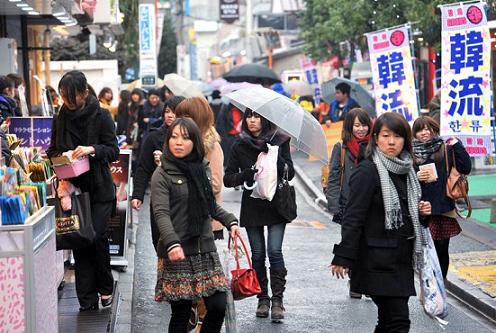Press Release
|
Many Japanese women visit Tokyo's popular Shin-Okubo district, known as a "Korean town," to enjoy "Han-ryu" South Korean goods and foods. (Asahi Shimbun file photo) |
The survey, released on May 7, also found that a large proportion of the respondents’ view of the other country turned negative over the past year, which was marked by South Korean President Lee Myung-bak’s visit to the Takeshima islets in August, a first by any South Korean president.
The islets in the Japan Sea, controlled by South Korea and claimed by Japan, are called Dokdo in Korean.
The annual survey was conducted by Genron NPO, a private Japanese group, and the East Asia Institute, a South Korean think tank, between March and April. It included interviews with 1,000 Japanese and 1,004 South Koreans.
Asked which of the two countries they feel closer to, 45.5 percent of the Japanese selected South Korea, while only 5.9 percent chose China.
In South Korea, 36.2 percent of the respondents chose China, far exceeding the 13.5 percent who picked Japan.
“South Koreans tend to give more weight to China (than to Japan),” said Yasushi Kudo, who leads Genron NPO, which is based in Tokyo.
Concerning the impression of the other country, 37.3 percent of the Japanese and 76.6 percent of the South Koreans said it is “not good.”
The most common reason cited by the Japanese respondents was “(South Korea) criticizes Japan over history and other issues,” which was 55.8 percent.
The number of South Koreans citing "the dispute over Dokdo" as a reason was 84.5 percent.
The survey showed that 39.6 percent of the Japanese and 46.7 percent of the South Koreans came to view the other nation negatively over the past year following the row over Lee’s visit to the islets.
Despite the South Korean government’s stance that a territorial dispute does not exist between the two neighbors, more than 60 percent of the respondents in each of the nations acknowledged that there is one.
The number of Japanese calling for the resolution of the row by taking it to the Hague-based International Court of Justice was 60.7 percent.
While 15.1 percent of the South Koreans said Seoul should agree with Tokyo's request to jointly take the dispute to the court, 37.7 percent, the most common response concerning the issue, said the nation should strengthen its control of the islets. Japan has decided against unilaterally taking the row to the ICJ.
The survey also showed that a large majority of the respondents in both nations were aware of the importance of improving communications between their top leaders.
More than 70 percent in both Japan and South Korea replied that holding summits with their nation's top leaders visiting each other was “necessary.”
On a possible visit to Yasukuni Shrine by the Japanese prime minister, 75.2 percent of Japanese did not take issue with one at all or as long as it “was done in a private capacity.”
But 60 percent of South Koreans said the prime minister should not visit the shrine in either an official or private capacity.
The shrine has been a flash point for years because it commemorates 14 Class-A war criminals along with the war dead. Japan colonized the Korean Peninsula from 1910 to 1945.
